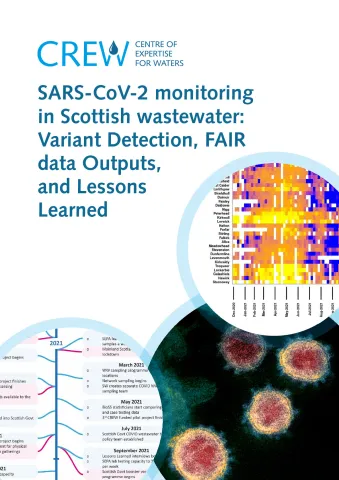Project summary
The virus that causes Covid-19 disease, SARS-CoV-2, is excreted by infected people into the sewage system and genetic material from the virus can be detected in wastewater samples. The prevalence of the virus has been monitored from June 2020 to the current time. This project built upon the programme of monitoring for SARS-CoV-2 in Scottish wastewater with the following research objectives:
- To develop a method to detect variants of the SARS-CoV-2 virus in wastewater.
- To share the outputs from the wastewater monitoring programme by Open Research methods.
- To conduct a ‘Lessons Learned’ review from the development and management of the programme and to infer any general lessons and recommendations for Scottish Government and its agencies in delivering future, urgent programmes.
The main results from the project were as follows:
- DNA next generation sequencing was the best method to detect SARS-CoV-2 variants in WW. The research team delivered variant detection from wastewater across Scotland for six months, capturing the spread of the Omicron variant from December 2021 and the BA.2 variant in the Spring of 2022, and refined detection methods in collaboration with other researchers.
- The Open Research team shared the programme’s technical outputs in six different ways, online and in person, with a web Homepage linking to all the resources to gain further value from the programme’s outputs. The programme’s data and protocols have broad potential, for example, the methodology for SARS-CoV-2 detection developed for SEPA could be adopted by other institutions or modified to monitor different pathogens.
- The Lessons Learned review found that the Scottish SARS-CoV-2 wastewater testing programme was an impressive achievement: a nationwide surveillance programme for a novel organism was developed collaboratively from a “standing start” in less than six months. This success was due to a combination of high-level support from key individuals within relevant organisations and the hard work and motivation of those working on the project. However, after this impressive start, the programme encountered some organisational issues that made the transition from innovative research to a routine testing programme challenging.
All three elements of this ambitious project sought to provide better evidence of the SARS-CoV-2 epidemic. The project makes several recommendations to inform future pandemic preparedness.
Project Outputs
